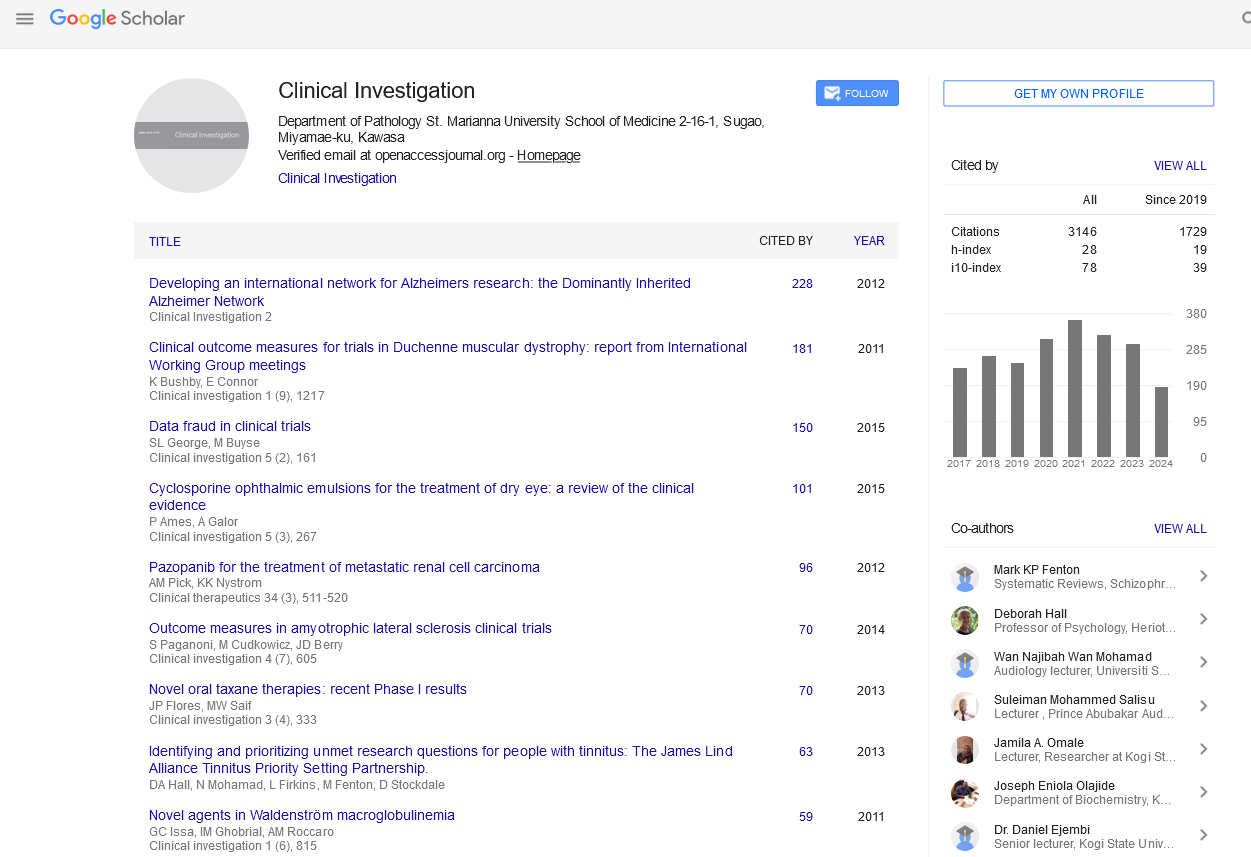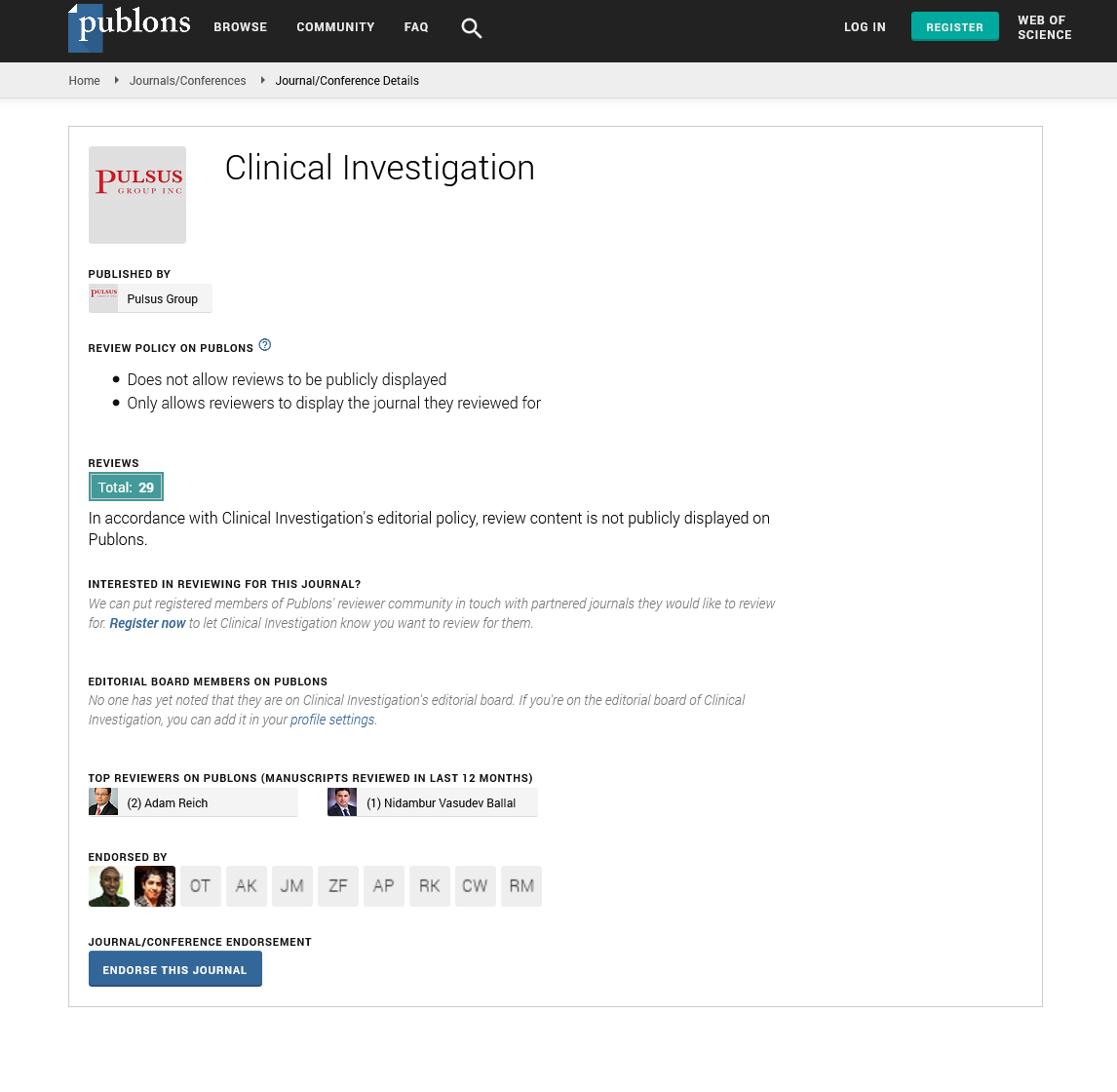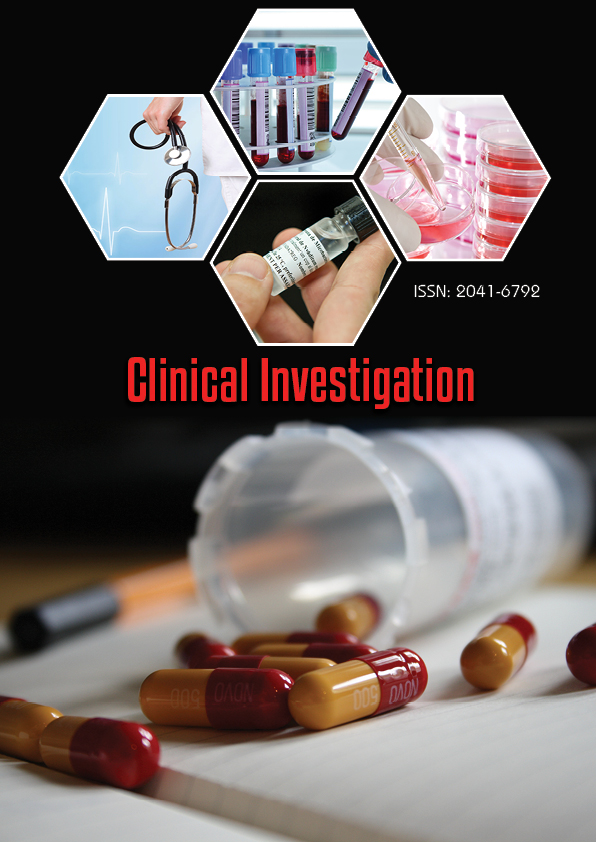Perspective - Clinical Investigation (2022) Volume 12, Issue 8
Biological agents and informed consent in internal medicine and rheumatology
- Corresponding Author:
- Patricia Riddle
Editorial Office, Journal of Clinical Investigation, London
E-mail: clinicalinvest@escienceopen.com
Received: 02-August-2022, Manuscript No. FMCI-22-74021; Editor assigned: 4-August-2022, PreQC No. FMCI-22-74021 (PQ); Reviewed: 18-August-2022, QC No. FMCI-22-74021 (Q); Revised: 24-August-2022, Manuscript No. FMCI-22-74021 (R); Published: 31-August-2022; DOI: 10.37532/2041-6792.2022.12(8).163-164.
Abstract
Perspective
The extensive and expanding usage of a heterogeneous class of molecules known as biological agents is a result of the demand for very effective treatments for rheumatologic illnesses. Concerns about safety and efficacy issues have been highlighted due to the growing experience with biological agents and must be addressed during the process of obtaining informed consent.
Every diagnostic and therapeutic medical procedure, as well as participation in clinical research, require informed permission. The ability of the patient to consent to treatment or clinical research is one of several criteria that must be met in order to grant valid informed consent, along with (a) the voluntariness of the decision-making process, (b) accurate and complete information disclosure, and (c). Language obstacles, cultural differences, and religious convictions may potentially affect the process of acquiring informed consent.
Evidence suggests that many clinical populations, particularly those with cognitive impairment or those experiencing mental disorders, run the risk of being unable to give informed consent to treatment. Rather than specific psychiatric diagnoses, psychiatric symptoms like mania and psychosis are among the known specific risk factors for incapacity. In acute medical inpatients, impaired therapeutic decision-making capacity also proven to be widespread and frequently undetected.
There is evidence that rheumatologic illnesses, cognitive decline, and psychiatric problems are all related, with rheumatic illnesses specifically linked to mood disorders. Furthermore, a sizable portion of patients with early-onset long-term systemic lupus erythematosus may experience psychosis and cognitive impairment. Other immune-mediated inflammatory disorders that may benefit from therapy with biological agents, such as inflammatory bowel disease, have also been linked to significant psychological morbidity, including psoriasis and pemphigus.
The danger of decisional capacity impairment in such individuals, including potential subtle variations of mental capacity to give informed consent, should be carefully examined because neuropsychiatric morbidity is common in rheumatologic illnesses. Furthermore, we contend that given the unique efficacy and tolerability profiles and peculiar pharmacological properties of biological agents, there is a strong need for specific, careful procedures to obtain informed consent in rheumatologic settings, which is even more true for patients who are receiving those treatments.
The majority of biological agents have a very complicated safety profile, making it difficult for patients to comprehend and value them fully. Associations with other pharmaceuticals commonly used to treat moderate to severe rheumatologic conditions (such as corticosteroids, traditional immunosuppressive treatments, or cytotoxic agents) have the potential to cause undesired neuropsychiatric side effects, such as anxiety and mood swings. Corticosteroid regimes are well recognized to cause mood changes, which might impair decision-making. Additionally, the potential mental consequences of biological medicines and combination therapy have not yet been fully understood.
Last but not least, special emphasis should be paid to the lack of conclusive evidence about the long-term effects of biological agents, particularly physical and psychotropic ones, and the danger of developing malignancies and/or serious infections.
The primary goal of the current review is to give a general overview of the key clinical and medical-legal principles related to informed consent. The most crucial traits of the main biological agents and their potential impact on informed consent procedures will therefore be the focus of the manuscript. Finally, we will quickly go over the methods that might be used in rheumatology clinical settings to assess patients' capacity for informed consent.
Moderate to severe phases of chronic incapacitating diseases represent the majority of medical problems that call for the use of biological agents. Biosimilar medications should be specifically mentioned even if they were not covered in the current paper because their manufacturing technique does not guarantee complete interchangeability with original biological medicines.
Most biological therapies demand that the patients have previously had tests with other conventional therapies, which are frequently marked by considerable toxicity, adding further burden. Biological agents' mechanisms of action, potential interactions, and side effects are also complicated and difficult to comprehend. Additionally, clinically significant depressed and anxiety symptoms are frequently seen in rheumatologic patients. Together, these factors highlight how complex the process of obtaining informed consent is and urge that patients who are eligible to receive biologic drugs have their mental ability status evaluated. Another significant source of criticality in the methods for obtaining informed consent is potential psychiatric comorbidities.
Analysis of the justifications for involvement in research protocols may reveal erroneous informed consent. Although it has reportedly been disregarded up to now, the risk of therapeutic misunderstanding in research methods or case studies utilizing biological therapies should be carefully considered.
The use of biological agents as a "last option" by a sizable portion of patients may be connected to other problems. For instance, the patient's perspective of her or his situation may be skewed by an urgent need for relief from excruciating pain, which could lead to an overestimation of potential benefits and an underestimating of hazards.
Promoting particular communication techniques within the doctor-patient interaction makes sense for doctors in this situation. Although it can be challenging to evaluate the success of doctor-patient communication, multiple writers have suggested various communication tactics, including the use of visual and technological aids.
Modern medicine's ideal approach must be regarded as achieving positive therapeutic outcomes over time, not just as a means of pain alleviation and concern for the safety of the treatment, as is often the case with delicate drug administration, such as in rheumatology. This is crucial when administering biological medicines to individuals who have clinically severe depressed and anxious aspects because of potential interactions and the negative effects.
The question of informed consent in patients receiving biological agents has not been specifically studied. Numerous research published information about the off-label use of biological agents, frequently without making any clear mention of informed the consent issues.
Although no studies have particularly addressed the issue of informed consent for biological agents and ethical issues of clinical research are ignored, biological agents constitute an effective method for treating rheumatologic debilitating disorders. Future research is required on patients' ability to make decisions and perceptions of the risk-benefit ratio of such medicines.


